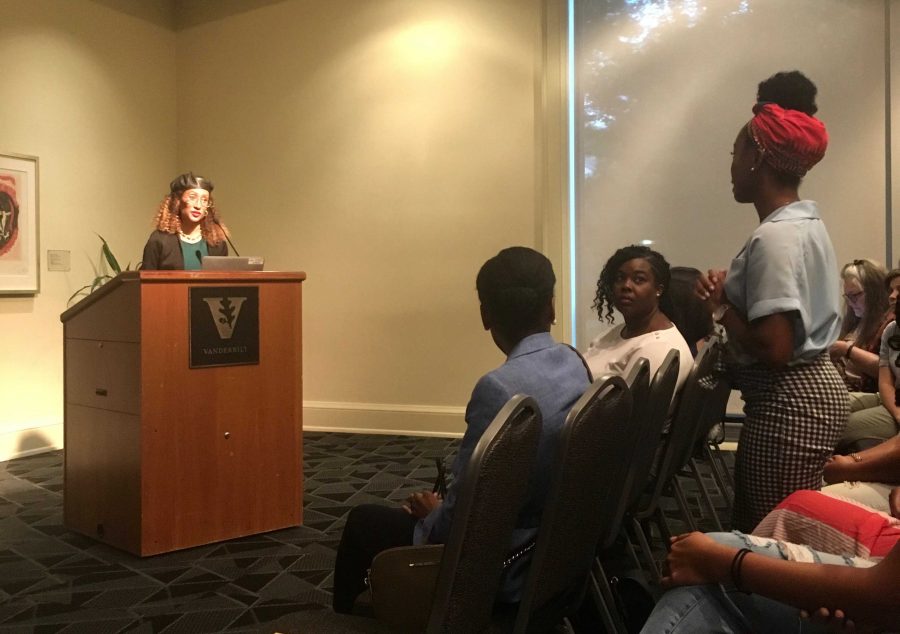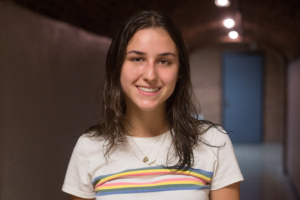Elaine Welteroth spoke about activism and Teen Vogue to a packed room of Vanderbilt students and faculty on Thursday afternoon. The crowd, largely made up of women of color, was animated, quick to respond with laughter or snaps during particularly funny or poignant moments of the lecture, entitled “The Accidental Activist: When Being You Is Just the Radical Act the World Needs.”
“We need all kinds of change agents, and they do come in all different forms,” said Welteroth. “[There are] the accidental activists, who are the ones who are resisting simply by existing in the fullness of their authenticity, in spaces that were not designed for them. And as I see it, no matter what kind of activist you are, the important thing is that you are activating.”
Welteroth did not consider herself an activist or a feminist until 2016.
“It was actually a fourteen-year-old girl named Rowan Blanchard who said something really profound in an interview for her cover story [for Teen Vogue],” Welteroth said. “She said ‘activism is a need to know, a need to care, and a need to act.’ That’s it. Simple, easy, access granted.”
Though she may not have called herself one until recently, Welteroth is one of today’s most high-profile activists. At age 29, she became the youngest-ever editor of a Conde Nast publication when she was promoted to editor-in-chief of Teen Vogue in April 2016. She was the second African-American Conde Nast editor in the media company’s 109 year history.
Though she left Teen Vogue earlier this year, Welteroth has been credited with reinventing the magazine as a platform where political and social-justice oriented pieces coexist with fashion and beauty content.
“Teen Vogue became the magazine that your daughter was reading and, probably, her dad too,” said Welteroth.
Under her leadership, the magazine pivoted to serve a new generation of young women: those who had a “need to know” about what was going on in America’s tumultuous political landscape and a desire to be activists for change. This change, though unexpected, caused Teen Vogue’s paper readership and website visits to skyrocket while most magazines were stagnant.
She explained that her activism arose from using her seat at the media table to advocate for others.
“In order to ignite lasting change, to truly change an industry from the inside out, and to rebuild broken systems, you have to change hearts and minds first,” said Welteroth. “And one powerful way to do that is through storytelling…I could be an authentic storyteller, and I could lift up the voices of marginalized communities.”
“Trailblazers are no good if they are not leaving signposts for the next generation of women who come up behind them to make it less confusing, less lonely,” said Welteroth. She proceeded to structure her lecture around a series of “signposts” that attendees could follow if they wanted to make a difference in the world. These included “wake up,” “find your tribe,” and “prepare for some resistance,” among others.
Women in the audience were struck by the similarities between them and Welteroth.
“Hearing that we had shared experiences, and seeing that she goes through the same thing that a lot of other black girls face and that she was able to work past that and still achieve all that she did was very powerful,” said senior Rayna Lunn.
Many felt that her words of advice rang true given the nature of her being an African-American woman at the intersection of two marginalized groups.
“What spoke to me the most about this lecture was Elaine’s idea of being an accidental activist,” said freshman Shelby Hart. “As a black woman I felt like I was always forced into this intersection where I was the one that everyone looked at in the classroom when we spoke about social subjects, and I couldn’t ignore my race, my color of skin and I also couldn’t ignore my gender.”
Many attendees noted that they would take her advice to heart as they continue at Vanderbilt and beyond.
“She made a point about how being on a college campus you can say whatever you want because you’re not in the real world,” said Hart. “There are limitations in the real world that do not exist here, and basically what that meant to me was be confident, be outspoken, be empowered.”



